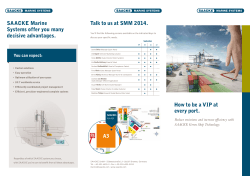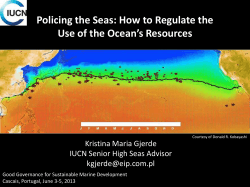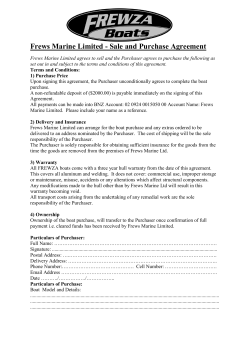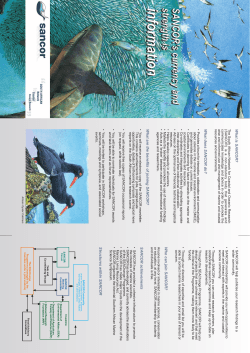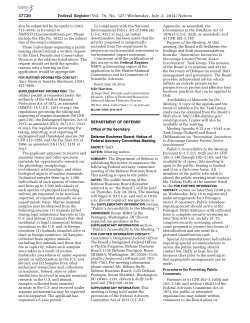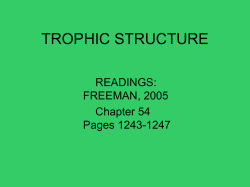
Document 212418
International Conference on MARINE ECOSYSTEM MANAGEMENT – HOW TO MAKE IT SUSTAINABLE? THE NORDIC COOPERATION IN FISHERIES 2010 2nd Announcement Source: Institute of Marine Research, Norway 26 – 27 May 2010 Hotel Arctic Ilulissat, Greenland Background of the conference: There are different opinions on how to interpret the concept of sustainable ecosystem management. The perspective is vastly different if one compares the views shared by communities dependent on harvesting from marine ecosystems, with the views of the public far away from such realities, typically living in the cities of the large industrialized countries. The marine ecosystems house a range of species, including marine mammals that are important to the inhabitants of the coastal and island communities in the North Atlantic. According to the 2008 Declaration on Seals and Society by the Nordic Council of Ministers governments should strive to achieve a balance between protection and use in the management of marine resources. This view is apparently not shared by the EU which in 2009, laid down restrictions on the imports and sale of sealskins. Who shall attend the conference: Users of the ecosystem, policymakers, managers, scientists and NGO’s. Programme of the conference: 25th of May: Arrival and registration 5:00 p.m. – 6:00 p.m. Practical information 6:00 p.m. – 7:30 p.m. Reception – welcome speech by the Honourable Minister of Fisheries, Hunting and Agriculture Ane Hansen 26th of May: Introduction (8:30 a.m.): Keynote speaker the Honourable Minister of Fisheries, Hunting and Agriculture Ane Hansen opening speech. Chair: Hans Peter Poulsen. Session 1: The Ecology of the North Atlantic: • Session 1 will give the management organs, users and NGO’s a basic introduction of the current ecological status of the marine environment, and how this information is processed into scientific advisory on harvest rates. - - - - What is the status of the distribution and migratory patterns of marine mammals in the North Atlantic and the Arctic Ocean and how do scientists apply population assessments in order to advise on harvest rates? – Dr Fernando Ugarte, Institute of Natural Resources in Greenland - What is the status of the distribution and migratory patterns of the most valuable fish and shellfish in the North Atlantic and the Arctic Ocean and how do scientists apply population assessments in order to advise on harvest rates? – Dr Hans Lassen, ICES - From science to management advice – single species to ecosystems. – Dr Christina Lockyer, General Secretary of NAMMCO Further questions to be discussed: • Are marine mammals implemented in the assessment of the marine ecosystems? • Is the current knowhow good enough to give advisory on sustainable management? Lunch Session 2: Policy-making in marine ecosystem management: • Session 2 will focus on the different management regimes of marine ecosystems, and which political guidelines these are based on. - Which political considerations form marine ecosystem management? – Gert Verreet, Policy Advisor with the Flemish Government – Environment, Nature and Energy Department - Culling of seals and cormorants in the Baltic Sea, a political controversial management tool. – Heikki Lehtinen, Ministry of Agriculture and Forestry, Finland Further questions to be discussed: • Is it political or biological concerns that should govern how the marine ecosystems are being managed? • Is the debate on hunting vs. conservation of the top predators in the marine ecosystems a form of cultural imperialism? Boat trip (5:00 p.m. - 7:00 p.m.). 27th of May: Session 3 (8:30 a.m.): Implementation of socioeconomic considerations in sustainable management: • Session 3 will focus on the economical impact the marine mammals have on fish stocks, and the socioeconomic value of the hunt. - - - - How does the ecological interaction between marine mammals and fish stocks impact the economic value of the marine ecosystem? – Dr Arne Eide, Associate professor in resource economics at the Norwegian College of Fishery Science, University of Tromsø - Does sustainable marine ecosystem management conflict with socioeconomic factors in Greenland? – KNAPK – The Organization of Fishermen and Hunters in Greenland - Products from seal – potential and possibilities. – Mona Gilstad, Marine Biologist - Pilot project: International management of seal – Networking to meet common challenges. – Liv Jorunn Hind, Scientist at Bioforsk Nord, Norway Further questions to be discussed: • Can decreased stocks of marine mammals increase the yields in fishery? • Is protection of marine mammals suppressing the coastal communities? Lunch Session 4: Ethics in sustainable management of the marine ecosystem - cultural and environmental aspects: • Session 4 will focus on the ethics ecosystem management. - - Manipulation of the marine ecosystem for economic benefits – is it right? – Patrick Lewis, WWF International Arctic Program - How should culture and identity influence sustainable ecosystem management? – Finn Lynge, former member of IWC for the Danish Ministry of Foreign Affairs and former MEP - Ecosystem management – an indigenous approach. – Aqqaluk Lynge, ICC Greenland Further questions to be discussed: • Is conservation of marine mammals based on the animal rights movement or concern of the ecosystems? • How are our different cultures influencing marine ecosystem management? Closing remarks. The objective of this conference is to compose a policy paper on sustainable marine ecosystem management. Invitation to discuss the pilot project presented by Liv Jorunn Hind Workshops will be arranged during the conference. Dinner (7:00 p.m.) – Hosted by the Minister for Fisheries, Hunting and Agriculture 28th of May: Departure Registration: Please register on http://norden2010.fo/Default.aspx?ID=9842 not later than Friday 7 May 2010. Steering group: Amalie Jessen, Ministry of Fisheries, Hunting and Agriculture (Greenland) Tore Riise, Ministry of Fisheries and Coastal Affairs (Norway) Madeleine Nyman, Metsähallitus – Natural Heritage Services (Finland) Charlotte Winsnes, North Atlantic Marine Mammal Commission (NAMMCO) Contact: Christina Heilmann Rasmussen, Ministry of Fisheries, Hunting and Agriculture, P.O. Box 269, 3900 Nuuk, Greenland. E-mail: chhr@nanoq.gl or apnn@nanoq.gl
© Copyright 2025
